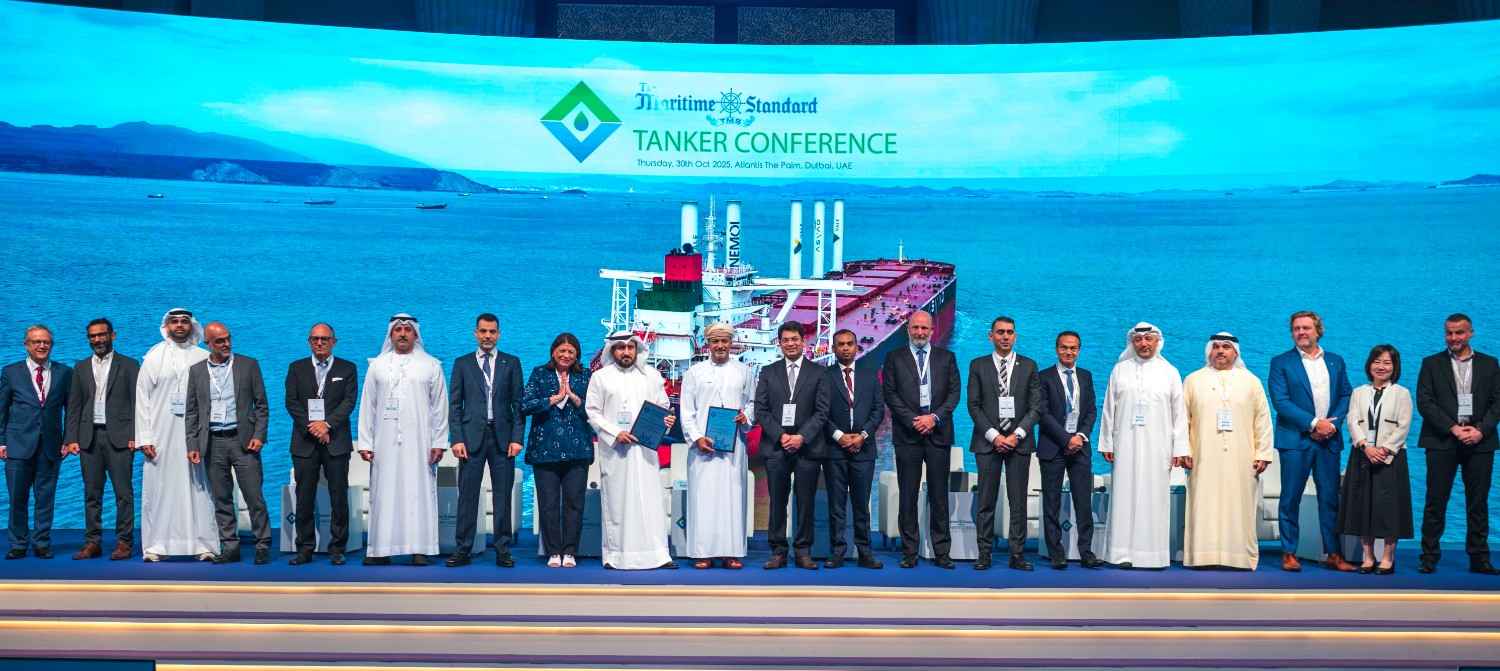
Geopolitical Uncertainties dominate at TMS Tanker Shipping Conference 2025
DUBAI: The Maritime Standard recently held its most successful Tanker Conference yet, as over 400 delegates registered to attend in person at the Atlantis, the Palm, Dubai recently. The tenth conference in this series, which had the theme “Tanker Shipping Negotiates Challenging Market Headwinds’ was dominated by market uncertainties, caused primarily by geopolitical factors.
Conference editor, Clive Woodbridge, said: “During the morning session the word ‘uncertainty’ was heard so many times I lost count! There is no doubt that external factors are having a great impact on tanker shipping right now, with new tariffs and port charges, sanctions, the trade tensions between the USA and China, conflicts in Gaza and Ukraine, the IMO’s pause on net zero regulations and the fast pace of technological change all coming into the mix. Rarely if ever have tanker shipping executives had to make strategic decisions against a backdrop of such volatility and unpredictability.”
This year’s keynote speakers were HE Sheikh Khaled Al Sabah, Acting CEO of Kuwait Oil Tanker Company (KOTC) and Dr Ibrahim Al Nadhari, CEO of ASYAD Shipping & Drydocks. Sheikh Khaled noted the fast pace of change driven by geopolitics, particularly highlighting the impact of sanctions and the presence of the so called ‘dark fleet’. But positively, he stressed the continued importance of tanker shipping as the “backbone of oil supply chains.”
Geopolitics was one of a number of factors that Dr Al Nadhairi said were keeping him awake at night, along with operational disruptions, insurance premiums, regulatory compliance and market volatility. His overall message was that there is a clear need to balance operational actions today with long term strategic planning. “This is key to navigating uncertainties and sustaining profitability in a volatile market,” he added.
Other panelists in the first session of the conference, which focussed on sustainable strategies to combat uncertainties, included Abdul Bari Alzubaidi, Senior Vice President, Ship Management, ADNOC Logistics & Services; Ali Abouda, Group Financial Officer, Gulf Navigation Holdings; Nafeesa Moloobhoy, Managing Director, Moloobhoy Group of Companies; Navin Kumar, Director, Drewry Maritime Research; Bard Poulsson, Senior Vice President, Lockton; Captain Ankara Arora, Global Market Leader, Tankers, Bureau Veritas Marine & Offshore; and Dipak Karki, Managing Director, DK2.
Abdul Bari stressed the need for a long-term commitment to decarbonisation but said there was a need to strike a balance with commercial day-to-day business requirements. Ali Abouda made the point that, “You can no longer separate geopolitics from shipping profit and loss forecasting,” echoed by Navin Kumar who argued that “Geopolitics is now driving tanker earnings more than market fundamentals.” He presented the audience with a ‘World Uncertainties Index’ which not surprisingly had risen sharply, almost off the scale, during 2025.
Session 2 in the afternoon, was expertly moderated by Ali Shehab, Global Director of Special Projects at DNV, who was joined on stage by Richard De Vries, Vice President, Business Development, Lloyds Register; Han Ning, General Manager, ShipBid.Net; Captain Gargan Dhillon, CEO (Dubai), West of England P&I Club; Katherine Yakunchenkova; General Manager, Al Safina Security; Captain Onur Yildrim, Marine General Manager, Advanced Polymer Coatings; Alexandra Burke, CEO, K2 Bunker Fuel Supply; Roger Harfouch, Sales Director, Marlink Communications; Captain Vikas Pandey, Founder and CEO of Shipfinex; and Ramee Rashid, Director, Seamaster Maritime Group.
Collectively these panelists discussed how best to boost operational efficiency while maintaining a focus on green shipping. Alexandra Burke argued that the bunker sector can no longer afford to separate profitability from environmental accountability and urged collaboration between stakeholders to reshape bunker trades for a sustainable market future.
Han Ning said she believed market volatility can create both risk and opportunities for tanker shipping. “Crises should be seen as being an opportunity to strengthen market position, build flexibility and capitalise on global shipping trade dynamics,” she suggested.
Gagan Dhillon stressed the need for companies to embrace insurance strategies. This he said would “help mitigate the financial impact of operational disruptions, while supporting long term planning for fleet renewal and green investments.”
Reflecting on the positive impact of the 2025 Tanker Conference, TMS Managing Director, Trevor Pereira, added, “It was fantastic to have a packed house right through to the end this year and to hear so many high-quality presentations. Everyone is battling with the unpredictability of market conditions, and this was a terrific opportunity for people to discuss strategies and network to evaluate ways of combating this unprecedented period of instability in the markets.”

